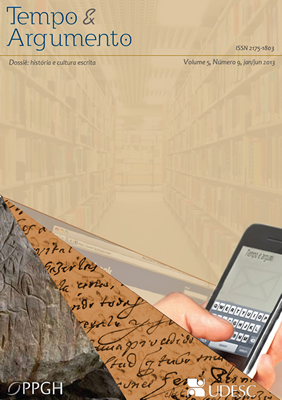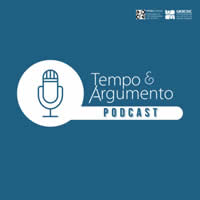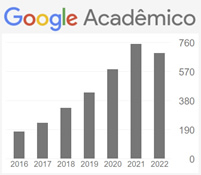When Clio plays the Pandoras: the archives between histories and memories
DOI:
https://doi.org/10.5965/2175180305092013188Keywords:
records, history, memory, traumatic eventAbstract
History and memory are not two exactly surimposable concepts and they are even less as soon as the past they describe has a traumatic history’s mark. In the heart of the struck relationships Clio and Mnemosyne then have, records are standing. In cases like these, the treatment they receive forms a special look-out post to see the innumerable issues that the recall of the past rises. If there are some who are doubtful of this, French works and essays of which this paper offers to summarize the major points, are good example of the validity of this assertion. As a counterpoint to the covetousness the records arouse, they show the power that our occidental representations attribute to their ownership. Target of another kind of abuse, the roughly handled records feed controversies, and by these ones, alliances change and the split lines move. On the memory scene, activists, professional historians, politicians, lawmakers and judges play a complicated game in that, as from the 80s, the witnesses take a part, just as the historians who came from the ranks of memory communities. To the test of proofs, memories knock together. Dominating and dominated, victimized and heroic, subjective and objective, emotional and rational memories confront each other in a crash of which the jolts inevitably affect history as a discipline.
Downloads
References
CŒURÉ, Sophie.; DUCLERT, Vincent. Les archives. Paris: La Découverte, 2011.
CŒURÉ, Sophie. La mémoire spoliée. Les archives des Français, butin de guerre nazi puis soviétique. Paris: Payot, 2007.
COMBE, Sonia. Archives interdites. L’histoire confisquée. Paris: La Découverte, 2001.
DOBRY, Michel (Org.). Le Mythe de l’allergie française au fascisme. Paris: Albin Michel, 2003.
DUCLERT, Vincent. L’avenir de l’histoire. Paris: Armand Colin, 2010.
FASSIN, Didier.; RECHTMAN, Richard. L’empire du traumatisme. Enquête sur la condition de victime. Paris: Flammarion, 2007.
HARTOG, François. Régimes d’historicité. Présentisme et expériences du temps. Paris: Le Seuil, Coll Points Histoire, 2012.
LABORIE, Pierre. Le chagrin et le venin. La France sous l’Occupation, mémoire et idées reçues. Paris: Bayard, 2011.
LAPIERRE, Nicole. Le cadre référentiel de la Shoah. Ethnologie française, XXXVII, 3, p. 475-482, 2007.
LAURENT, Sébastien (Org). Archives “secretes”, secrets d’archives? Historiens et archivistes face aux archives sensibles. Paris: CNRS Editions, 2003.
MOULINIE, Véronique. Polyphonie ou Cacophonie? La mémoire des républicains espagnols en Languedoc-Roussillon. In: CIARCIA Gaetano (Org.). Ethnologues et passeurs de mémoire. Montpellier, Paris: MSH Montpellier, Karthala, 2011, p. 255-276.
ROBIN, Régine. Un passé d’où l’expérience s’est retirée. Ethnologie française,XXXVII, 3, p. 395-400, 2007.
TODOROV, Tzvetan.Les abus de mémoire. Paris: Arléa, 1995.
WIEVIORKA, Annette. L’ère du témoin. Paris: Hachette, 1998.
Downloads
Published
How to Cite
Issue
Section
License
Copyright (c) 2013 Tempo e Argumento

This work is licensed under a Creative Commons Attribution-NonCommercial 4.0 International License.
The articles published by the magazine are for free use, destined for educational purposes and not commercial. The copyrights are all granted to the magazine. The articles whose authors are identified represent the expressed opinion of its authors and not the official position of the Tempo e Argumento magazine or of the Postgraduate Program in History of the Universidade do Estado de Santa Catarina.




